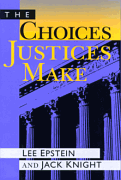The Choices Justices Make
Washington, D.C.: CQ Press (1998)
Lee Epstein and Jack Knight, Washington University in St. Louis
Click here for the data
Click here for more information about Choices, including a detailed Table of Contents
Description
In Choices we argue that justices are strategic actors who realize that their ability to achieve their goals (primarily policy goals) depends on a consideration of the preferences of other actors, of the choices they expect others to make, and of the institutional context in which they act. We call this a strategic account of judicial decisions because the key ideas it contains are derived from the rational choice paradigm, on which strategic analysis is based and as it has been advanced by economists and political scientists working in other fields.
To assess the plausibility of this account and to determine whether it provides us with any real leverage to understand judicial decisions, we develop a picture of justices as strategic seekers of legal policy and explore how justices so motivated go about making choices. After providing an overview of our argument in Chapter One, we unpack its three key components: Chapter Two documents the importance of policy goals; Chapter Three directs attention towards behavioral manifestations of strategic activity aimed at achieving policy ends, and Chapters Four and Five take up the institutions that structure such activity. Finally, in Chapter Six, we consider the implications of our argument, especially as they pertain to the development of law and to the articulation of future research programs on the Court. Most important, we argue, is that law—as it is generated by the Supreme Court—is the long-term product of short-term strategic decision making.
keywords: strategic analysis, strategic account, rational choice, Supreme Court, bargaining, Craig v. Boren, separation of powers, collegial courts
